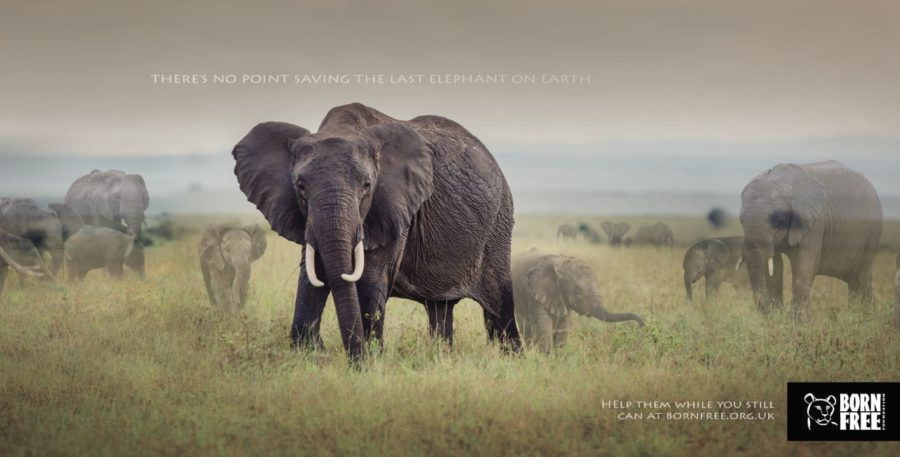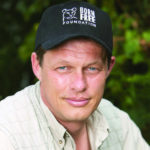14th November 2016 London, UK
I believe that we can still win for the animals

This week, delegates from 54 countries, governments, wildlife professionals, conservationists, wildlife trade experts, charities such as Born Free and our friends in the press and media, will gather in Hanoi, Vietnam, to drive forward efforts to end the illegal wildlife trade, especially the trade in ivory and rhino horn.
Vietnam, our hosts, is regarded as one of the destination countries for illegal wildlife trade but things may be changing.
On November 12th, in an indication of its growing commitment to change and to the protection of threatened wildlife, Vietnam will destroy 2,000 kg of seized ivory, together with 70kg of seized rhino horn. The following is a copy of the text of my video message to the meeting which has been requested by the United Kingdoms’s Foreign and Commonwealth Office and which will be broadcast in the run-up to the meeting.
I have been working on this issue for nearly 33 years. Battles have been won and lost but I believe that we can still win for the animals and that the tide is, at last, turning.
“The upcoming Hanoi Conference on Illegal Wildlife Trade is the third in a series of global multi-stakeholder gatherings, initiated in 2014 in London by the United Kingdom government and United for Wildlife, and followed by the Kasane meeting, hosted by the Government of the Republic of Botswana in 2015. They are all intended to help address the negative impacts of wildlife trafficking on iconic wild species, notably elephants, rhino and lions.
This vitally important meeting, hosted by the government of the Socialist Republic of Vietnam, provides an opportunity to evaluate the progress made so far towards achieving the objectives set out in The London Declaration and enhanced in The Kasane Statement, and to set further goals which will enhance protection, reduce demand and disrupt criminal activities.
Critical to this are 6 key objectives:
1. Support and improve intelligence-led enforcement designed to infiltrate and dismantle the activities of organised criminal networks which currently see the illegal exploitation of wildlife as a low risk, high reward, activity.
2. In line with United Nation’s recommendations, harmonise international penalties and legal sanctions associated with wildlife crime, including deterrent levels of sentencing and the sequestration of assets to increase the risk that those involved in organised wildlife crime are exposed to and to make it clear that, when it comes to wildlife crime, there is nowhere to run.
3. Support and further encourage those involved in wildlife law enforcement in the field, those involved in applying evidence-based demand reduction strategies and those in the shipping and transport sector to help ensure there is no hiding place for those who would trade in the body parts of some of our planet’s most iconic species.
4. As endorsed at CITES CoP17, close domestic ivory markets thereby removing the opportunity for illegal wildlife products such as ivory to be laundered through a legal trade.
5. Destroy or dispose of ivory stockpiles in line with the measures also agreed at CITES CoP17
6. Harness the talents, energy and commitment of all stakeholders, including civil society, in uniting to defeat wildlife trafficking and secure a future for wild species.
On behalf of The Born Free Foundation, a member of the Species Survival Network, and our supporters worldwide, we urge the delegates to this Conference to:
- redouble their efforts
- build on progress to date
- set targets and timelines for agreed objectives
- support the implementation of those objectives
- respond fully to the deep concerns expressed by people around the world who fear for the survival of wild elephants, rhino, lions and many other species
Finally, and specifically, we would respectfully ask the government of Vietnam to further demonstrate its leadership on these issues and its commitment to conservation by introducing measures – including working with partners to resolve human-elephant conflict – that would result in a doubling of the number of wild elephants in the country within the next 10 years.”


Thank you for your very wise words Mr Travers and for all that you and the Born Free Foundation have done and are doing to turn these words into actions. Your support to the front line of conservation in Zambia has really helped to make a big difference.
Please continue to your efforts to raise awareness and to be the voice for wildlife and those of us in the field.
We appreciate your efforts, thank you!
Just wondering why I cannot get any interest from any group for a technology which would allow any commodity to be traced to an exact geographical area
eg
– timber from one side of the river which is supposedly protected compared with areas which have timber concessions.
– Supposed captive bred animals which are actually wild caught.
– confiscated animals or animal products to their exact point of origin
– food traceability for COOL verification and food substitution incidents
We have GOT to win the fight. We cannot allow these animals to be hunted to extinction. We must educate the children & adults of all countries, so many are niave as to the plight of Asian elephants and the enormity of the problem of ivory, rhino horn and skins of animals. We have to get the message out there.
Something must be done. I think the most powerful way from my imagination is not to burn the tusks,although I throughly understand why they have to be burned. But to to use the remains of Elephants to make a powerful statement with art. Use the tusks to form if necessary a huge piece of art that will stand for the destruction of elephants.Or before they are burned smaller projects, I do so want this to stop. It hurts my heart to see this-so am trying to come up with something so powerful-to see it will change the world of pouching- I am a dreamer I guess-But art can be power& power can be change.(Like how the Aids quilt changed peoples perception of the disease)